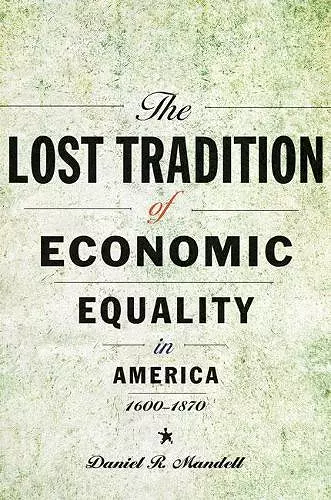The Lost Tradition of Economic Equality in America, 1600–1870
Format:Hardback
Publisher:Johns Hopkins University Press
Published:2nd Jun '20
Currently unavailable, and unfortunately no date known when it will be back

An important examination of the foundational American ideal of economic equality—and how we lost it.
Winner of the Missouri Conference on History Book Award for 2021
The United States has some of the highest levels of both wealth and income inequality in the world. Although modern-day Americans are increasingly concerned about this growing inequality, many nonetheless believe that the country was founded on a person's right to acquire and control property. But in The Lost Tradition of Economic Equality in America, 1600–1870, Daniel R. Mandell argues that, in fact, the United States was originally deeply influenced by the belief that maintaining a "rough" or relative equality of wealth is essential to the cultivation of a successful republican government.
Mandell explores the origins and evolution of this ideal. He shows how, during the Revolutionary War, concerns about economic equality helped drive wage and price controls, while after its end Americans sought ways to maintain their beloved "rough" equality against the danger of individuals amassing excessive wealth. He also examines how, after 1800, this tradition was increasingly marginalized by the growth of the liberal ideal of individual property ownership without limits.
This politically evenhanded book takes a sweeping, detailed view of economic, social, and cultural developments up to the time of Reconstruction, when Congress refused to redistribute plantation lands to the former slaves who had worked it, insisting instead that they required only civil and political rights. Informing current discussions about the growing gap between rich and poor in the United States, The Lost Tradition of Economic Equality in America is surprising and enlightening.
Mandell successfully recovers the often obscured legacy of economic equality and moral economy that emerged from the English Civil War, as it informed debates about proper republican polity during the American Revolution . . . Highly recommended.
—Choice
Widening economic inequality has been one of the most striking and significant problems facing the United States during the past half-century . . . Mandell's useful book belongs on the reading lists of the scholars, elected officials, and others who will be engaged with figuring out a path ahead.
—Journal of Interdisciplinary History
Specialists and researchers will find Mandell's sophisticated and insightful analysis deeply engaging, yet the book's writing is so clear that it could be assigned to advanced undergraduates. The fact that economic inequality is one of the great issues of the twenty-first century makes Lost Tradition especially timely and important.
—Journal of the Early Republic
Mandell usefully recovers the many and varied attempts to forge a link between economic and political equality in American culture from colonial times to the Reconstruction era, and he reminds readers that there have been numerous cries for greater economic justice since.
—Rowena Olegario, University of Oxford, Journal of British Studies
Well-researched and well-constructed...
—American Historical Review
- Winner of Missouri Conference on History Book Award 2021 (United States)
ISBN: 9781421437118
Dimensions: 235mm x 156mm x 26mm
Weight: 590g
328 pages